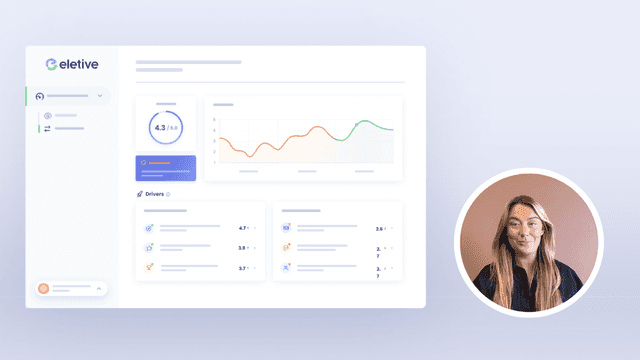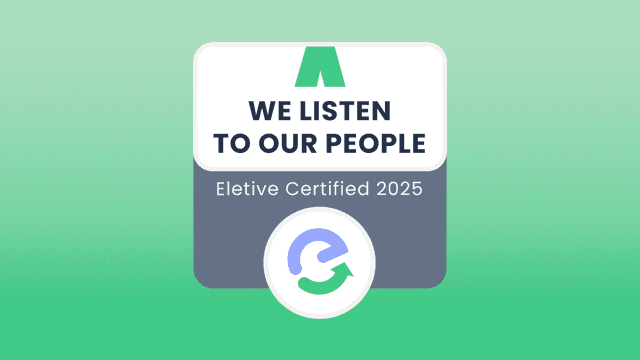Get the latest insight from Normative's HR Manager on the role of climate & ESG commitment in employee engagement and recruitment.
In today's rapidly evolving business landscape, the role of Human Resources (HR) extends beyond traditional functions like recruitment and employee management. One emerging challenge is "climate quitting," a phenomenon where employees leave their jobs due to their employer's inadequate environmental policies.
This blog post explores the integral role HR can play in addressing this issue, based on insights from HR Director at Normative, Carolina Bardon Hagstedt, on ESG (Environmental, Social, and Governance), employee engagement, and climate quitting.
This session took place at Eletive's HR event, People Success & the Future of Work, welcome to watch the full session below:
Understanding climate quitting
Climate quitting refers to employees' decision to resign from their positions due to their company's failure to act on climate change. This trend underscores a growing consciousness among the workforce about environmental sustainability and ethical business practices. Employees are increasingly prioritising employers whose values align with their own, particularly regarding environmental stewardship.
The role of HR in mitigating climate quitting
HR departments can be pivotal in mitigating climate quitting by fostering a culture of sustainability and transparency. Here are some strategies HR can implement:
Integrate ESG goals into company values: HR can work with leadership to ensure that ESG goals are deeply embedded into the company's mission and values. This integration helps in aligning the workforce with the company’s long-term sustainability goals.
Promote environmental initiatives: By promoting and participating in environmental initiatives, HR can demonstrate the company’s commitment to sustainability. Initiatives can range from reducing the company’s carbon footprint to engaging in community-based environmental projects.
Transparent communication: HR should maintain transparency about the company’s environmental policies and progress towards sustainability goals. Regular updates and open communication can build trust and demonstrate a genuine commitment to ESG principles.
Employee involvement: Encouraging employee involvement in sustainability efforts can increase engagement and retention. HR can organise workshops, create green teams, and support employee-led environmental projects.
Training and development: Providing training on sustainability practices and the importance of ESG can empower employees to contribute to the company’s environmental goals. This can also foster a sense of responsibility and purpose among the workforce.
Recognise and reward: Recognising and rewarding employees who contribute to sustainability initiatives can motivate others to get involved. Awards, recognition programs, and other incentives can highlight the importance of these efforts within the company culture.
How can employee engagement be affected by ESG?
Employee engagement can be significantly affected by a company's Environmental, Social, and Governance (ESG) initiatives. Here are several ways ESG influences employee engagement:
Environmental impact
Sense of purpose: Employees are increasingly motivated by a sense of purpose beyond profit. When a company is committed to environmental sustainability, employees often feel proud to be part of an organisation that prioritises ecological responsibility, which can boost morale and engagement.
Personal alignment: Many employees, especially younger generations, prioritise working for companies whose environmental values align with their own. This alignment can lead to higher job satisfaction and commitment.
Social responsibility
Community involvement: Companies that actively contribute to their communities can foster a sense of pride and belonging among employees. Volunteering opportunities and social initiatives can enhance team spirit and personal fulfillment.
Diversity and inclusion: A strong commitment to social equity, diversity, and inclusion can create a more supportive and engaging workplace environment. Employees are more likely to feel valued and respected, leading to higher engagement levels.
Governance practices
Transparency and trust: Good governance practices, including transparency and ethical behavior, build trust between the company and its employees. When employees trust their leadership, they are more likely to be engaged and loyal.
Ethical standards: Companies with strong ethical standards can foster a culture of integrity and accountability. Employees who believe their company acts ethically are more likely to be engaged and motivated.
Overall impact
Attracting talent: Companies with robust ESG practices are often seen as more attractive employers. Talented individuals who value ESG principles may seek out these companies, leading to a more motivated and engaged workforce.
Retention rates: Employees are more likely to stay with a company that reflects their values and treats them well. ESG initiatives can reduce turnover and increase employee retention, which is a key component of sustained engagement.
Innovation and creativity: ESG initiatives often encourage innovative thinking and problem-solving, as employees work on projects that address environmental and social challenges. This can create a dynamic and stimulating work environment.

Practical steps for companies
Communication: Regularly communicate the company's ESG goals, progress, and achievements to employees. Keeping everyone informed fosters a sense of involvement and ownership.
Employee Involvement: Involve employees in ESG initiatives, allowing them to contribute ideas and participate in projects. This hands-on involvement can significantly boost engagement.
Recognition and Rewards: Recognise and reward employees who actively contribute to ESG goals. Acknowledging their efforts can enhance motivation and engagement.
In summary, ESG initiatives can greatly enhance employee engagement by fostering a sense of purpose, aligning company values with those of employees, building trust through ethical governance, and creating a positive and inclusive workplace culture.
Conclusion
The issue of climate quitting presents both a challenge and an opportunity for HR departments. By taking proactive steps to integrate and promote ESG goals, HR can enhance employee engagement, reduce turnover, and build a more sustainable and resilient organisation. In a world where employees are increasingly valuing ethical and sustainable business practices, HR’s role in driving these initiatives is more crucial than ever.


























